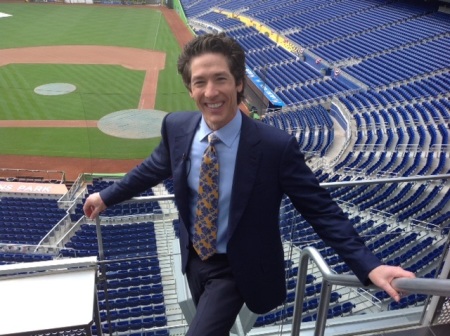Interview: Joel Osteen on Life, Tragedy and Why He Shuns 'Prosperity Gospel' Label

Joel Osteen, senior pastor of the 40,000-member Lakewood Church in Houston, Texas, spoke with The Christian Post on Friday at Marlins Park baseball stadium in Miami, Fla. – one day before his scheduled America's Night of Hope event – to talk about his life in ministry, how to respond when bad things happen to good people, and why he doesn't like being grouped in with televangelists who preach the prosperity gospel.
The following is an edited transcript of the interview.
CP: What biblical message is represented in the work being done by the 150 Generation Hope Project volunteers who came to Miami to donate their time, money and labor to help local nonprofits that serve the community?
Osteen: The gist of it is that we don't just come in the word, but we come in deed as well – love your neighbor as you love yourself. My part, obviously, is the message and inspiration, but we like to be an example of what it means to be the hands and the feet of Jesus Christ. And that is to help the suffering, and lift the oppressed and the fallen. And part of it is to help bring justice and hope. Jesus said when you do it to the least of these … and that's who we're reaching out to.
CP: What pressures did you have growing up as the son of a prominent minister?
Osteen: You know, it's interesting, because I didn't feel pressured. I know that some of my friends that were preachers' kids did. I was never forced to go to church, so I didn't feel pressure. I guess, in a sense, you knew that people were watching. I think that my children are the same way, in that I don't know if they feel pressured. I guess maybe in one way they do.
I don't think that I fit in that mold, because like I said, a lot of my friends did feel that pressure. A lot of preachers' kids are some of the most rebellious kids in the world. I never was like that. And I think that's because my parents were the same in the church as they were at home. So we didn't see mixed messages. I think that's the difference. Because my friends didn't. Their parents were one way in the pulpit and then things were a lot different at home.
CP: Many people go to your church because they're drawn to you and they want to have a personal relationship with you. But with 40,000 members, it's impossible to meet everyone, so how do you make that connection and keep your members?
Osteen: You know, it's something that's always a challenge in a big church. I think one way you bring that connection is from the pulpit, meaning that when I talk up there, I try, even in this big stadium, I try to just talk like I'm talking to one person.

The other thing is we try to get people involved in smaller groups, and encourage them to get on an ushering team, serve in the choir, the children's ministry or men's ministry. I grew up in a church that started with 90 people. Until I was probably 10 or 12, we had 200 people in the church. So I grew up in a small church. My dad never planned on it being super big, it's just the people kept coming. So it's a new thing that we have to deal with.
There's no doubt, it's a bigger challenge and there's bigger turnover. The bigger the church gets, the smaller we have to become. So we're always recruiting volunteers, we have 5,000 who are our core group. When you become a volunteer, you're going to be put on a team, and you're going to have a captain who's going to have 10 people under him. It's kind of like the military, it's all structured. Then, if you're not there for a couple weeks, your captain is going to call you and say, "hey, what's going on, can we pray for you?" If they'll get plugged in like that, it's easy for us.
We've also found that some people want to be anonymous. They'll come for a year, they'll sit up top, they don't stand up when they sing. After a while, they have to get comfortable, it's new to them. They weren't raised like me.
Victoria and I try to pour our heart and soul into the services and to help people. And I think as long as they're getting helped and what we call, being fit spiritually, I think they keep coming back.
CP: People see you as being perpetually happy, for those who don't know you personally, what are your struggles?
Osteen: I think all of us fight discouragement and the blues, if you call it that. I've always been very happy. I've always been easy going and I've always been very encouraging, it's just my personality.
For 36 years, before I was a pastor, I was the same way. This is just who I am. I think my struggles are no different than anybody else – people coming against you, relationship things, there's always financial pressure to raise money for the ministry and things like that. I only teach what I live. I say "Lord, I thank you for my health, my strength, and I thank you for this opportunity." I try to look on all the great things God's done, and not focus on the negative. It's a perspective.
The older I get, the better I understand that every day is a gift. You know, the tragedy in Boston, those people were just living life. There's no guarantee of tomorrow. And part of my whole philosophy is: this day is too important to live it angry, upset, discouraged or stressed out if plans don't work out. This is life, and I'm going to move on. I think part of it, too, is believing that God's in control. That if a door closes or if something happens, God can use it for good. And if we're walking in his way, then it's his plan, and let's just relax and go with it.
CP: Do you have an accountability partner?
Osteen: I do. More than one. Plus I have a real tight family. I have my brother, Paul, my sisters, and Don, my brother-in-law, and others that I'm tight with. But I also have a couple more who are well known, and I wouldn't want to mention their names – people who are on my advisory board, some officially and some unofficially. I pick up the phone, once every four months, call them to ask them something important and to get good advice – just people that can speak into my life.
Then, I also have a couple of pastors that are real close to me that I bounce ideas off of. Paul, especially early on, he'd say, "Joel, you're saying this, but here's how it's coming out." You know, I was learning, and I'm still learning.
CP: You grew up with Pentecostal roots, how would you say church has changed for you as the senior pastor of Lakewood Church?
Osteen: I grew up with my dad being Pentecostal and I felt like it was charismatic. I think it's changed a little bit in that my dad's focus was to bring the power of the Holy Spirit. I heard his message 1,000 times. His goal was to bring down the denominational walls that separate us. And I really think that we're living in the day my dad dreamed of.
When I grew up, at least in my household, there was the Baptists, the Methodists, Catholics and others. And we never crossed over. But this is a day where it seems like the denominational names mean less and less, and I mean that very respectfully, but they're not separating us.
My church now is filled with people of every denomination. Victoria grew up in the Church of Christ, so I think in that sense it's changed for the better – there's not so many things separating us. Here at Marlins Park, I'm sure there will be every denomination. I had somebody at my church Sunday who came by afterwards to say, "that was a great sermon," and coming from an Atheist that means a lot.





















